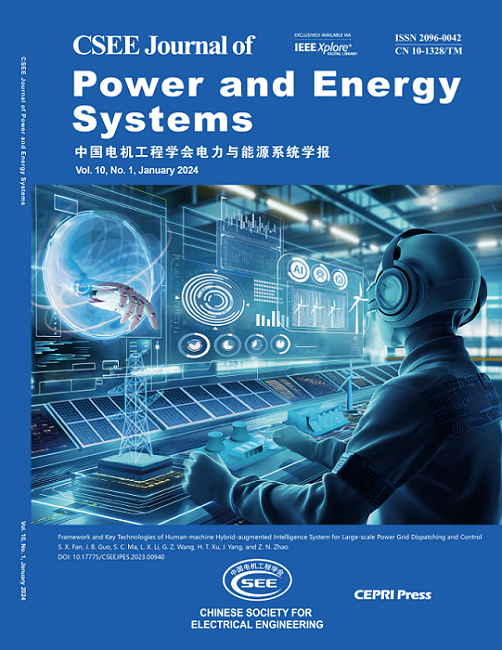Wide-Area Active Frequency Control with Multi-Step-Size MPC
IF 5.9
2区 工程技术
Q2 ENERGY & FUELS
引用次数: 0
Abstract
The construction of UHV AC/DC hybrid power grids and the integration of large-scale renewable energy have led to significant frequency stability issues. To enhance the frequency regulation capacity within areas and fully utilize the mutual supportive capacity among areas, active frequency control (AFC) theory has been proposed and developed based on the concept of active feed-forward control. However, existing AFC methods have limitations in computational solutions and control effects in large-scale, wide-area interconnected power systems. To address these shortcomings, this paper proposes an improved AFC method based on multi-step-size model predictive control (MSS-MPC). Through multi-step-size discretization, an improved model predictive control algorithm for AFC is derived based on the iterative solution of the multi-step-size linear quadratic regulator model, which ensures control accuracy through precise prediction and enhances the control performance through additional prediction. Based on the collaboration of two-level dispatching agencies and the consideration of differences in control objectives among areas at different stages, an improved three-stage AFC strategy is proposed, which aims to suppress additional frequency disturbances after control model switching by proposing the active-passive switching strategy. Case studies demonstrate that, compared with the existing AFC method, the proposed AFC method with the MSS-MPC algorithm has a better control effect and better computational performance.广域主动频率控制与多步长MPC
特高压交/直流混合电网的建设和大规模可再生能源的并网带来了显著的频率稳定性问题。为了提高区域内的频率调节能力,充分利用区域间的相互支持能力,在主动前馈控制的基础上提出并发展了主动频率控制理论。然而,现有的AFC方法在大规模广域互联电力系统的计算解和控制效果方面存在局限性。针对这些不足,本文提出了一种基于多步长模型预测控制(MSS-MPC)的改进AFC方法。通过多步长离散化,基于多步长线性二次型调节器模型的迭代解,推导出一种改进的AFC模型预测控制算法,通过精确预测保证控制精度,通过附加预测提高控制性能。基于两级调度机构之间的协作,考虑不同阶段区域间控制目标的差异,提出了一种改进的三阶段AFC策略,通过提出主动式无源切换策略,抑制控制模型切换后的额外频率干扰。实例研究表明,与现有的AFC方法相比,本文提出的基于MSS-MPC算法的AFC方法具有更好的控制效果和更好的计算性能。
本文章由计算机程序翻译,如有差异,请以英文原文为准。
求助全文
约1分钟内获得全文
求助全文
来源期刊

CSEE Journal of Power and Energy Systems
Energy-Energy (all)
CiteScore
11.80
自引率
12.70%
发文量
389
审稿时长
26 weeks
期刊介绍:
The CSEE Journal of Power and Energy Systems (JPES) is an international bimonthly journal published by the Chinese Society for Electrical Engineering (CSEE) in collaboration with CEPRI (China Electric Power Research Institute) and IEEE (The Institute of Electrical and Electronics Engineers) Inc. Indexed by SCI, Scopus, INSPEC, CSAD (Chinese Science Abstracts Database), DOAJ, and ProQuest, it serves as a platform for reporting cutting-edge theories, methods, technologies, and applications shaping the development of power systems in energy transition. The journal offers authors an international platform to enhance the reach and impact of their contributions.
 求助内容:
求助内容: 应助结果提醒方式:
应助结果提醒方式:


